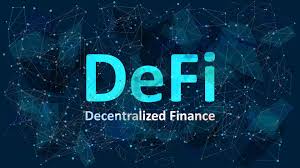
Unveiling Decentralized Finance: The Future of Financial Freedom
This article all about decentralized finance, including what it is, how it is used, pros and cons and how someone can get involved.
INTRODUCTION TO CRYPTO
CryptoTokin
5 min read


Introduction: Decentralized Finance (DeFi) has emerged as a groundbreaking innovation within the cryptocurrency ecosystem, revolutionizing traditional financial services by leveraging blockchain technology to create a more open, accessible, and transparent financial system. In this comprehensive guide, we will explore the fundamentals of DeFi, including its definition, use cases, mechanisms, and how individuals can participate in this transformative movement. Whether you're a newcomer intrigued by the potential of DeFi or an experienced investor seeking deeper insights, this article aims to provide a comprehensive understanding of DeFi and its implications for the future of finance.
What is Decentralized Finance (DeFi)? Decentralized Finance, or DeFi, refers to a broad category of financial applications and protocols built on blockchain networks, such as Ethereum, that aim to democratize access to financial services, eliminate intermediaries, and empower individuals to control their assets and participate in global financial markets. Unlike traditional finance, which relies on centralized institutions such as banks, exchanges, and clearinghouses to facilitate transactions and manage assets, DeFi operates in a decentralized manner, enabling peer-to-peer transactions, smart contracts, and automated protocols without the need for intermediaries.
Key Features of Decentralized Finance:
Open Access: DeFi platforms are open to anyone with an internet connection and compatible wallet, allowing users from around the world to access financial services without requiring permission or approval from centralized authorities.
Interoperability: DeFi protocols are interoperable, meaning they can seamlessly interact and integrate with each other, enabling composability and the creation of complex financial products and services.
Transparency: DeFi operates on transparent and auditable blockchain networks, where transaction data, smart contract code, and asset holdings are publicly verifiable, enhancing trust and accountability in the financial system.
Security: DeFi protocols leverage blockchain technology and cryptographic mechanisms to ensure security, immutability, and resilience against hacking, fraud, and censorship.
Programmability: DeFi platforms enable programmable financial instruments and smart contracts, allowing developers to create customizable financial products, automate processes, and execute complex transactions autonomously.
Use Cases of Decentralized Finance: Decentralized Finance encompasses a wide range of use cases and applications, including but not limited to:
Decentralized Lending and Borrowing: DeFi platforms such as Compound, Aave, and MakerDAO enable users to lend and borrow digital assets, earning interest on deposited funds or accessing liquidity by collateralizing their assets without the need for traditional intermediaries.
Decentralized Exchanges (DEXs): DEXs such as Uniswap, SushiSwap, and PancakeSwap facilitate peer-to-peer trading of cryptocurrencies without relying on centralized exchanges, allowing users to swap tokens directly from their wallets in a trustless and non-custodial manner.
Decentralized Stablecoins: Stablecoins such as DAI, USDC, and Tether (USDT) are cryptocurrencies pegged to stable assets such as fiat currencies (e.g., USD, EUR), commodities (e.g., gold), or algorithmic mechanisms, providing stability and liquidity in the volatile crypto market.
Decentralized Asset Management: DeFi platforms like Yearn Finance, Curve Finance, and Balancer enable users to automate investment strategies, yield farming, and liquidity provision, earning rewards and optimizing returns on their cryptocurrency holdings.
Decentralized Insurance: DeFi protocols such as Nexus Mutual and Cover Protocol offer decentralized insurance solutions, allowing users to purchase coverage against smart contract failures, hacks, and other risks in the DeFi ecosystem.
How to Get Involved in Decentralized Finance: Getting involved in DeFi requires a few essential steps to navigate the decentralized landscape and start utilizing decentralized financial services:
Obtain Cryptocurrency: To participate in DeFi, you'll need to acquire cryptocurrency assets such as Ethereum (ETH), which serves as the primary currency for interacting with DeFi protocols and paying transaction fees on the Ethereum network.
Set Up a Wallet: Choose a cryptocurrency wallet that supports Ethereum and ERC-20 tokens, such as MetaMask, Trust Wallet, or Coinbase Wallet. Install the wallet extension or app on your device and securely store your private keys and recovery phrases.
Explore DeFi Platforms: Research and explore various DeFi platforms and protocols to identify opportunities that align with your financial goals and risk tolerance. Start with well-established platforms with a track record of security and reliability, and gradually explore new projects as you gain experience and confidence in the DeFi ecosystem.
Educate Yourself: Educate yourself about the fundamentals of DeFi, including concepts such as smart contracts, liquidity pools, impermanent loss, and governance tokens. Stay informed about market trends, protocol updates, and security best practices to make informed decisions and mitigate risks in the DeFi space.
Start Small: Begin by experimenting with small amounts of cryptocurrency and familiarizing yourself with different DeFi protocols and features. Start with basic actions such as lending, borrowing, or swapping tokens, and gradually explore more advanced strategies and opportunities as you gain confidence and experience.
Pros and Cons of Decentralized Finance:
Pros:
Financial Inclusion: DeFi opens up access to financial services for underserved populations, enabling anyone with an internet connection to participate in global markets and access financial products and services without relying on traditional intermediaries.
Security and Transparency: DeFi operates on transparent and auditable blockchain networks, where transactions are publicly verifiable, and assets are secured by cryptographic mechanisms, enhancing trust, and accountability in the financial system.
Innovation and Experimentation: DeFi fosters innovation and experimentation in financial technology, enabling developers to create novel financial products, automate processes, and explore new use cases for blockchain technology.
Permissionless Innovation: DeFi platforms are permissionless, meaning anyone can build, deploy, and interact with financial applications and protocols without requiring approval or authorization from centralized authorities.
Cons:
Smart Contract Risks: DeFi protocols are powered by smart contracts, which are susceptible to coding errors, vulnerabilities, and exploits that can result in financial losses for users. Users must conduct thorough audits and due diligence before interacting with DeFi protocols to mitigate smart contract risks.
Market Volatility: The cryptocurrency market is highly volatile, with prices subject to rapid fluctuations and market uncertainty. DeFi participants may be exposed to significant price risk and asset volatility, affecting the value of their holdings and investment returns.
Regulatory Uncertainty: DeFi operates in a regulatory gray area, with unclear or evolving regulations governing cryptocurrency and blockchain-based financial services. Regulatory changes and enforcement actions could impact the legality, compliance, and operation of DeFi platforms and protocols.
User Experience Challenges: DeFi platforms may present usability challenges and complexities for novice users, including unfamiliar interfaces, technical jargon, and complex processes. Improving user experience and onboarding processes is crucial for broader adoption and usability of DeFi.
Conclusion: Decentralized Finance (DeFi) represents a paradigm shift in the global financial system, offering unprecedented access, transparency, and innovation in financial services through blockchain technology. By democratizing access to financial markets, eliminating intermediaries, and empowering individuals to control their assets, DeFi has the potential to revolutionize traditional finance and reshape the future of money. However, as with any emerging technology, it's essential for participants in the DeFi ecosystem to conduct thorough research, exercise caution, and stay informed about risks, opportunities, and best practices. By embracing the principles of decentralization, transparency, and financial sovereignty, individuals can harness the power of DeFi.


